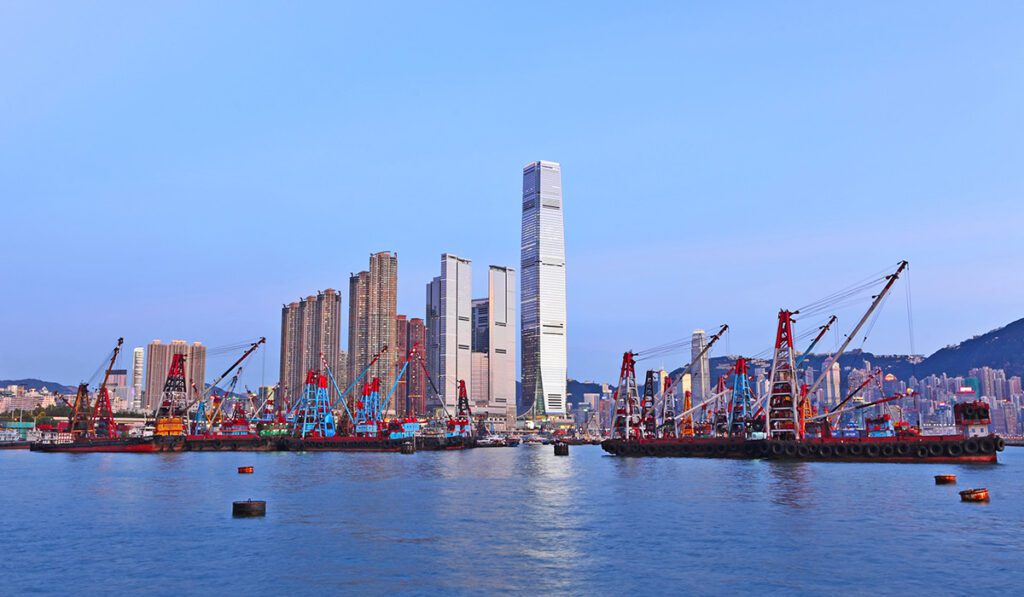

In this article, we delve into the intricacies of one of the world’s most dynamic business environments, providing you with invaluable insights into the opportunities and advantages that come with Hong Kong free trade zone when trading in Hong Kong.
What is a Free Trade Zone?
In international trade, a free trade zone (FTZ) stands as a pivotal concept for businesses seeking strategic advantages. An FTZ is a specialized economic zone designed to facilitate the import, storage, handling, manufacturing, and re-export of goods under specific customs regulations. Hong Kong, a global economic hub, boasts its own Free Trade Zone, fostering seamless trade operations.
In essence, FTZs, also known as enterprise zones, eliminate tariffs and trade quotas, offering a conducive environment for businesses to thrive. These zones, strategically located around international airports, major seaports, and national frontiers, leverage geographic advantages to bolster trade. Hong Kong follows suit, encouraging financial freedom within its FTZ, supported by special government regulations, tax breaks, and unwavering economic support.
While goods within a free port are exempt from normal customs inspection and duties, Hong Kong maintains some restrictions for matters of national security, public safety, health, or multilateral obligations.
Trading in Hong Kong
Hong Kong holds an unparalleled strategic position in the realm of global trade, securing its place as the eighth-largest trading entity worldwide in merchandise trade. Renowned for its exceptional efficiency, this special administrative region hosts one of the world’s most advanced international ports, acting as a pivotal conduit facilitating trade connections among more than 600 destinations.
Goods imported and exported from Hong Kong’s free trade zones and free ports enjoy exemption from customs control, eliminating trade barriers. The absence of limits on foreign investment attracts global investors to engage in trade within Hong Kong.
Additionally, the process of importing and exporting products in Hong Kong is streamlined, involving minimal documentation and exempting tariffs, value-added tax (VAT), customs fees, and goods and service tax (GST). However, certain commodities, including liquors, hydrocarbon oil, tobacco, and methyl alcohol, are subject to excise duty.
Hong Kong has emerged as a key trading center for Asia, acting as a gateway to China and facilitating trade between Europe and mainland China. Its significance lies in being an entrepôt, importing goods and services from one country and exporting them globally.
Free Trade Agreements in Hong Kong
Hong Kong, at the forefront of fostering international trade, has established Free Trade Agreements (FTAs) with several nations, including mainland China, the European Free Trade Association (EFTA), New Zealand, Chile, Macao, ASEAN, Georgia, and Australia. These FTAs serve to reduce or eliminate tariffs and trade barriers, fostering a conducive environment for businesses of all sizes.
Hong Kong free trade zone also aligns with the principle of comparative advantage, promoting specialization in areas of production, leading to lower costs and enhanced economies of scale. Hong Kong’s active participation in global trade organizations underscores its commitment to stimulating economic growth and integration.
Hong Kong’s Free Trade Agreement with China, known as the CEPA, provides tariff-free export of Hong Kong-origin goods and preferential access for specific service sectors. The continuous expansion of Hong Kong’s FTA network aims to secure favorable conditions for goods and services to enter the mainland and international markets.
Benefits of the Hong Kong Free Trade Zone
The Hong Kong free trade zone offers distinct advantages, particularly in the realm of bond transactions. Unlike offshore U.S. dollar bonds, Hong Kong free trade zone bonds transact in various currencies. This diversity minimizes the risks associated with exchange rate fluctuations.
Investors in Hong Kong free trade zone bonds benefit from segregated accounts, effectively dividing funds within the zone and beyond. The flexible issuance rules, coupled with a dispute resolution mechanism aligned with Chinese characteristics, make Hong Kong free trade zone bonds an attractive option for issuers in mainland China.
Moreover, Hong Kong free trade zone bonds open new investment and financing channels, diversifying capital sources and increasing flexibility for issuers. As Chinese enterprises increasingly opt for Hong Kong free trade zone bonds for offshore financing, it signals a shift towards a more robust and dynamic offshore financial system.
Regional Comprehensive Economic Partnership
Hong Kong’s pursuit of joining the Regional Comprehensive Economic Partnership (RCEP) underscores its commitment to global economic cooperation. With 15 member countries, including key trading partners, joining the RCEP aligns with Hong Kong’s strategy to maximize its free trade policy, fostering economic cooperation in the region.
Even without RCEP membership, Hong Kong’s existing FTAs and free trade policies position it strongly in the global trade landscape. The region has already signed eight FTAs, and its active engagement in international trade organizations ensures a resilient and dynamic approach to global commerce.
How We Can Help – Our Trading Service
At Premia TNC, we understand the nuances of trading in the Hong Kong free trade zone. Our team of experienced and accredited business consultants is dedicated to helping you navigate the complexities of business compliance requirements. From understanding FTAs to leveraging the benefits of the Hong Kong free trade zone, we provide comprehensive support to ensure your business thrives in the dynamic landscape of international trade.
Premia TNC is committed to guiding you through every step, ensuring your business not only complies with regulations but also thrives in the competitive world of international trade. Contact us today for a FREE consultation and to explore how our consulting services can elevate your business to new heights in the Hong Kong free trade zone.
Hong Kong Free Trade Zone – FAQs
1. What is the primary advantage of trading in Hong Kong's Free Trade Zone?
The primary advantage lies in the elimination of tariffs and trade barriers, creating a conducive environment for businesses to thrive.
2. Are there any restrictions on goods within Hong Kong's Free Trade Zone?
While goods are generally exempt from customs inspection and duties, restrictions may apply for matters of national security, public safety, health, or multilateral obligations.
3. What role does Hong Kong play in trade between Europe and mainland China?
Hong Kong serves as an entrepôt, importing goods and services from one country and exporting them globally, making it a key trading center for Asia and a gateway to China.

premiatnc
View All BlogsRelated Posts
April 15, 2024
Trademark Registration In Hong Kong: What You Should Know
Trademark registration in Hong Kong…
April 15, 2024
Importance of Hong Kong Company Financial Statements: How to Prepare It Well
In the realm of business, Hong Kong…
March 29, 2024
Everything You Need to Know About Hong Kong Invoice Requirements
Compliance ensures smooth financial…




